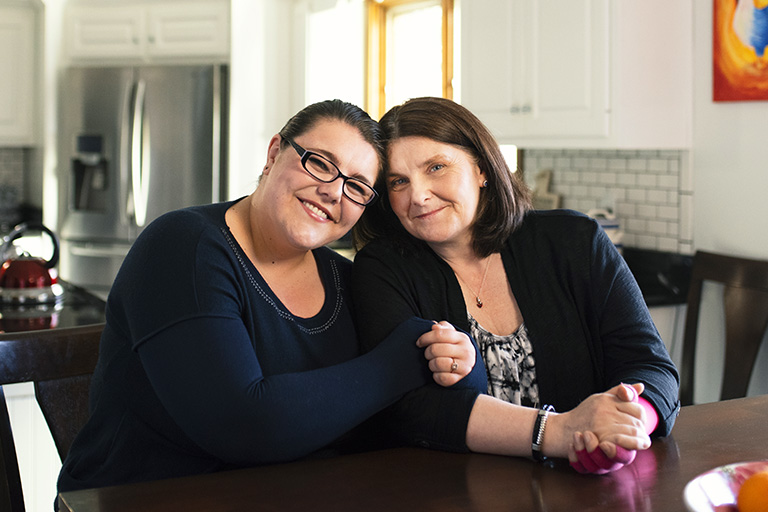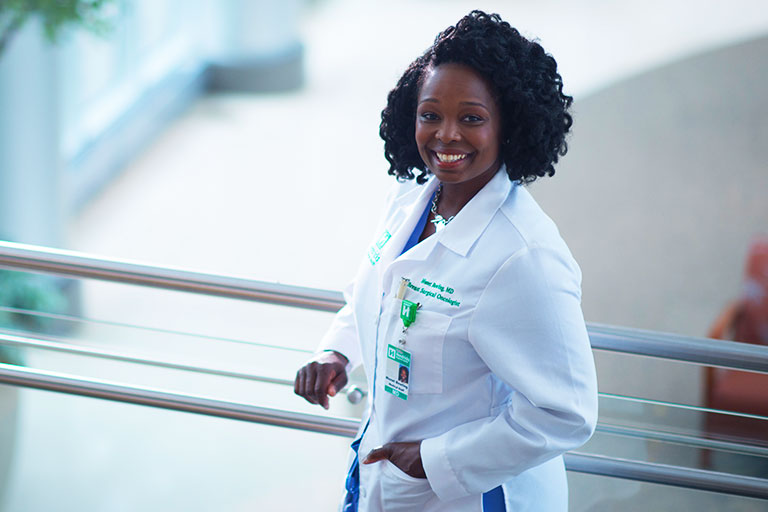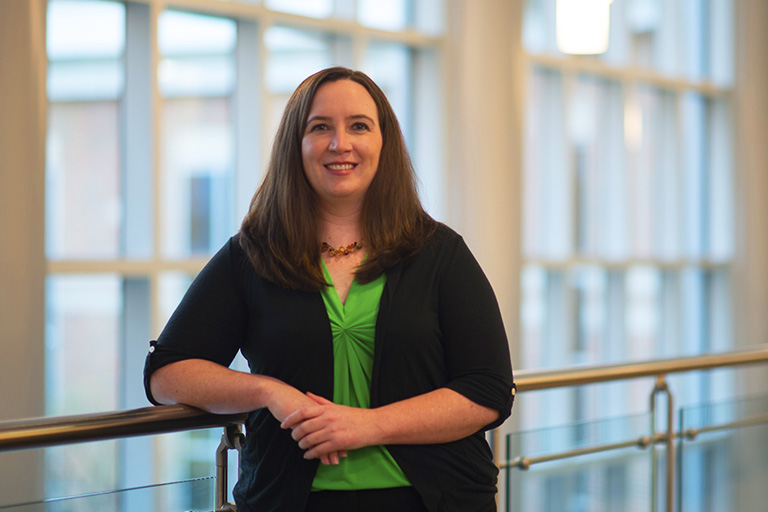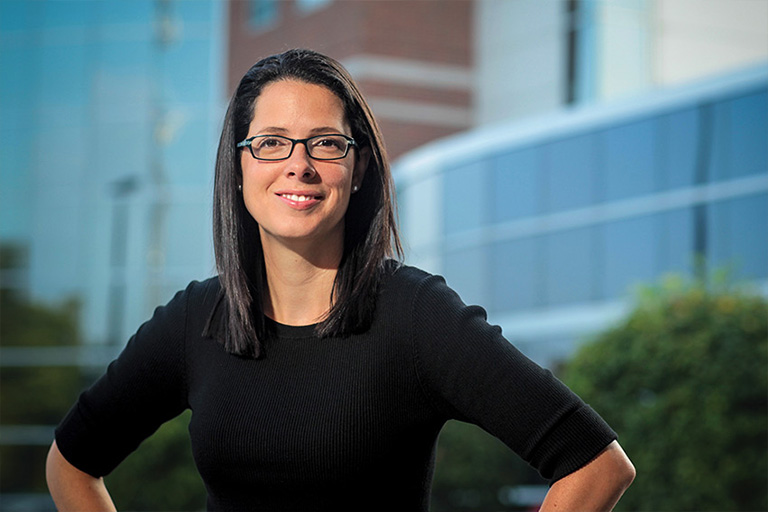1 in 8 women will develop breast cancer in her lifetime. But, with early detection, the five-year survival rate is almost 100%. That's why it's so important for women of all ages to be aware of their breast health, and for women age 40 and over to schedule an annual mammogram.
Our Center for Breast and Bone Health is among a prestigious group of breast centers nationwide named to the National Accreditation Program for Breast Centers from the American College of Surgeons Commission on Cancer, and has been designated a Breast Imaging Center of Excellence.
Center for Breast and Bone Health
Our Center for Breast and Bone Health, located at our Danville and Brownsburg hospitals, includes our special Follow-Up Breast Program. Our experienced team provides a continuum of breast health diagnostics, treatment and supportive care, including a full complement of breast surgery, medical oncology, radiation oncology and plastic and reconstructive surgery.
If a patient is diagnosed with breast cancer at the Hendricks Regional Health Breast Center, they are seen by a fellowship-trained breast surgical oncologist within 24 hours. Discover our wide range of state-of-the-art services offered to both men and women at the Danville campus location.
Mammography Services
Mammography Guidelines
Mammograms serve a vital role in breast cancer screening. A mammogram is an x-ray examination used to detect abnormalities in the breast. Mammograms can also detect breast disease in patients who are experiencing pain, discharge or have a lump in the breast.
The American Cancer Society recommends that women ages 40 and older have a routine mammogram screening every year for as long as they are in good health, and who show no signs or symptoms of breast cancer. This may change if you are at higher risk and your physician has talked to you about starting your screenings early. A doctor's order is not required to schedule mammogram services.
3D Mammography
Digital breast tomosynthesis, or 3D mammography, is a FDA-approved tool capable of detecting breast cancer up to 15 months earlier than a 2D mammogram. 3D mammograms provide a clearer scan, allowing our team to detect smaller breast cancers, pinpoint tumor size and location, and reduce follow-up testing.
Our physicians feel all patients can benefit from having a 3D mammogram and should take advantage of the advanced capabilities. Patients who have a family history of breast cancer or who have dense breast tissue are excellent candidates for this 3D imaging option.
Mammography FAQs
Find answers to frequently asked questions (FAQs) about mammography services at Hendricks Regional Health.
Mammogram Resources
Learn more about 3D mammography and the reasons to get screened by reading the following PDF.
What to Expect During Your Mammogram
At Hendricks Regional Health, we offer the newest state-of-the-art 3D mammography services, as well as breast imaging services, including digital mammography screenings, breast MRIs, and ultrasounds. 3D mammography is covered under several Medicare plans, as well as some insurance companies. If your insurance company does not cover 3D mammography, you may need to pay an additional fee of approximately $60. Grants awarded by the Indiana Breast Cancer Awareness Trust (IBCAT) help make it possible for us to provide free mammograms and diagnostic services to those who qualify for financial assistance, as well as offer specialized support to patients following a diagnosis.
A standard screening mammogram takes only about 15 minutes, with results mailed the next day. A diagnostic mammogram takes about 30 minutes, with results available before the patient goes home. If additional follow-up such as a biopsy is needed, it may be scheduled the same day. During every mammogram, our staff will determine if a patient at higher risk should move into our Special Follow-Up Breast Program. Even if you have had a normal mammogram, your risk factors may make you a good candidate for the high-risk breast program.
At Hendricks Regional Health we want to provide as much information as possible for our patients to make an educational decision about this vital preventive screening. Please contact us with any questions, and visit our Frequently Asked Questions page for further reading.
High Risk Evaluation & Surveillance
Those who have a personal and/or family history of cancer could be a candidate for genetic risk evaluation and high risk surveillance at the Hendricks Regional Health High Risk Prevention Clinic. The genetic risk evaluation is a blood test that screens for over 20 genes across 8 important cancer types. For women especially, BRCA1 and BRCA2 gene mutations pose an increased risk for breast and ovarian cancer.
Hereditary cancer screening and genetic testing is an important step in identifying future risk and developing the best medical management prevention plan.
Additional Breast Imaging Services
Breast Ultrasound
Breast ultrasounds can be used to evaluate symptoms like pain or swelling, to distinguish between solid tumors and fluid-filled cysts, and to examine growths or lumps found by a mammogram screening. This technique uses sound waves to create images of all areas of the breast; no radiation is used. Breast ultrasounds do not take the place of routine mammograms or breast exams, as they do not always detect early signs of breast cancer.
Stereotactic Biopsy
A stereotactic biopsy utilizes computer-aided detection to help pinpoint suspicious areas, such as calcifications or other breast distortions, assisting radiologists in diagnosis. Stereotactic biopsies employ digital technology to guide physicians to the breast lesion. Breast MRI technology processes breast images at a much higher resolution. Performed on patients newly diagnosed, breast MRI gives physicians the best opportunity to find additional cancerous lesions or cancer in the second breast early.
Every Woman Has a Story
Patient Stories

Every woman has a story. From breast cancer diagnosis to reconstructive surgery, discover how Hendricks Regional Health helped these incredible women write their next chapter.
Meet Dr. Bowling

Monet Bowling, MD, is a board-certified breast surgeon at Hendricks Regional Health. Learn her one-of-a-kind approach to helping her patients stay healthy, happy and breast cancer free.
Meet Dr. Scott

Rachel Scott, MD, is a plastic and reconstructive surgeon. Learn how she delivers expert care to her patients, including those with breast cancer, and helps them become their most confident selves.
Meet Dr. Mattingly

Anne Mattingly, MD, is a breast surgical oncologist who believes in patient-centered care. Here’s how she relates to her patients and walks them through their breast cancer journey.
Survivorship Program
Our Survivorship Program gives individuals who have battled breast cancer access to support and educational programs to help survivors and their loved ones live their best life after cancer.